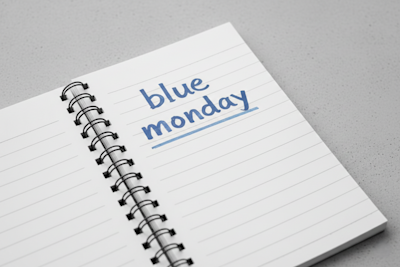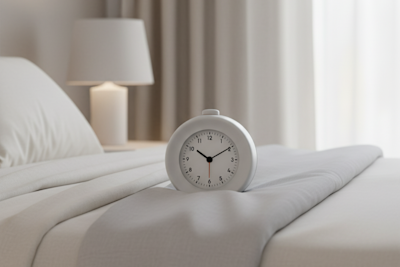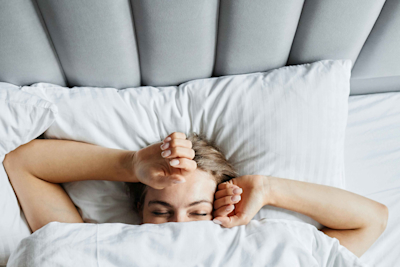
How sleep affects mental health
It’s time to talk about sleep & mental health.
We all know that sleep is important, but why? What does it actually do for us when it comes to mental health? And what happens when we don't get enough of it?
Sleep and its role in mental health
A good night's sleep is crucial for a healthy mind. The amount of sleep you need varies from person to person, however everyone needs eight to nine hours of restful slumber each night. Inadequate sleep can affect your mood, memory and learning ability. It can also increase stress levels and lead to weight gain by disrupting the body's ability to metabolize food properly.
“Sleep deprivation can negatively affect your psychological state and mental health.”
Sleep deprivation has been linked with depression and anxiety disorders in some studies; however, it's still unclear how much a lack of sleep may contribute to these mood disorders. It is more clearly established that lack of sleep impacts psychological well-being by interfering with our "default mode network" (DMN), which controls our inner monologue. When we are awake or otherwise mentally engaged with something outside ourselves (like work), DMN activity decreases—but when we're asleep, DMN activation increases again until morning light breaks through our eyelids, signaling the start of another day on Earth. [1]
Mudita Harmony 2
The paradox of sleep deprivation
The paradox of sleep deprivation is that, like any other physiological function, we need sleep in order to stay alive and healthy. However, one could argue that we also need to be awake and alert during the day in order for our society to run smoothly. This means that there is a point where an individual's need for sleep clashes with their ability to perform tasks at work or school. This can lead to poor mental health if this conflict isn't resolved—or better mental health if it is. [2]
Sleep deprivation can affect your psychological state by:
Making you feel more depressed or anxious
Making you more aggressive toward others
What happens to the body when you don't get enough sleep?
When you're sleep deprived, your body releases more stress hormones. These hormones increase appetite and cravings for high-calorie foods. In addition to the typical "fight or flight" response, they also cause a strong desire to eat unhealthy foods (think cookies, cakes and chips). This can lead to weight gain and eventually obesity if left unchecked.
Getting less than 6 hours of sleep per night has been linked with an increased risk of heart disease, diabetes and depression. Sleep deprivation also affects memory and concentration which negatively impacts learning ability in children as well as adults.[3][4][5]
Sleep deprivation can lead to mental illness
That’s right. If you don’t get enough sleep, it can lead to mental illness.
According to several studies, approximately 50 million Americans suffer from chronic insomnia or other sleep disorders and nearly 70% of working adults experience a period where they feel tired and sleepy during the day over a two-week period in a given year.[6][7]
While many people will experience periods of poor sleep without being diagnosed with an illness, it could still be a sign that something more serious is going on inside their bodies.
A good night's sleep contributes to overall health and well-being
The body produces a number of hormones during sleep that are involved in regulating mood, memory, and learning. Insufficient sleep can affect both the production of these chemicals and their effectiveness in the brain. As a result, people who don't get enough shut-eye may be more prone to depression or anxiety disorders. Sleep also plays a role in regulating appetite: an uninterrupted night's slumber is associated with reduced hunger levels by daybreak. If you're not getting enough sleep regularly (or at all), your cravings for food will likely increase as you start feeling hungrier and more fatigued throughout the day.
How much sleep do you need?
There's no one-size-fits-all answer when it comes to how much sleep you need. It depends on your age, health, and lifestyle—as well as what's going on in your life at the moment.
The National Sleep Foundation recommends that adults get between seven and nine hours of sleep a night. But some people may need more or less than that because of factors like their age and activity level. For example, young adults might not feel tired until later in the day; older adults may find they need more rest because they're less active than younger people.[8]
If you're having trouble falling asleep regularly or staying asleep throughout the night, talk with your doctor about what could be causing your symptoms (and whether there are any medical conditions that are contributing). A medical professional can also help determine if an issue such as depression could be affecting your ability to fall asleep or stay asleep properly—and how they can help address these issues together with treatment options such as therapy sessions or medication adjustments.
Other things that affect your sleep
Besides the obvious, there are many other things that can disrupt your sleep. Stress, eating habits and medication can all affect how you sleep. Sleep hygiene is also an important factor in getting proper rest. Your circadian rhythm (or body clock) helps determine when you need to be asleep and awake throughout the day. If you go to bed at different times every night, it can throw off this rhythm and make it harder for you to fall asleep or stay asleep throughout the night.
You can make a positive impact on your mental health by getting quality sleep.
You can make a positive impact on your mental health by getting quality sleep. Getting enough rest is essential to maintaining a healthy mind and body, as well as keeping stress levels under control. [9]depression, anxiety disorders, bipolar disorder and other serious mental illnesses. While many factors go into determining how much sleep we need each night (age being one component), most adults need between 7-9 hours of quality shut-eye each night to feel rested the next day.
Getting enough rest means more than simply lying down for eight hours—it also involves practicing good "sleep hygiene," which means that you have an environment conducive to falling asleep quickly without distractions like bright lights or noises from outside sources.
While everyone has different preferences when it comes time for offline bedtime rituals such as reading, journaling, playing soft music, as well as turning off all electronics completely approximately 60-90 minutes before bedtime, it’s important to to take time to relax and unwind before bed, as a way of signaling to your body that it’s time for sleep.
Bottom Line
Getting enough sleep is one of the best things you can do for your mental health. It’s not just important for your physical well-being, but also has an impact on your psychological state and overall happiness. When you don't get enough rest, it can negatively affect the quality of your life. However, with these tips, we hope that will no longer be a problem.
We invite you to take a look at our Sleep Better resource page which covers all the important factors that impact our quality of sleep. Also, please check out similar articles featured on our blog and learn more about proven tips for better health and overall well-being.
You might also consider joining our FORUM Community where we discuss ideas and exchange information about all things connected to wellness and digital well-being.
Related stories

What is Blue Monday & How to Deal with Seasonal Blues
Feeling the winter blues? Discover how to overcome seasonal sadness with mindfulness, better sleep, limited screen time, and meaningful connections.

Why Analog Alarm Clocks Are Better for Improved Sleep
Learn why analog alarm clocks improve sleep quality. Remove blue light and phone distractions from your bedroom for deeper rest and calmer, healthier mornings.

Why Sleep is the Foundation of Every Good Habit
Quality sleep is the foundation of every good habit. Discover how better rest helps you regain focus, energy, and routine after summer.
If you'd like to receive the best stories from our blog, keep up to date with our progress and get notified about our product releases and special discounts.